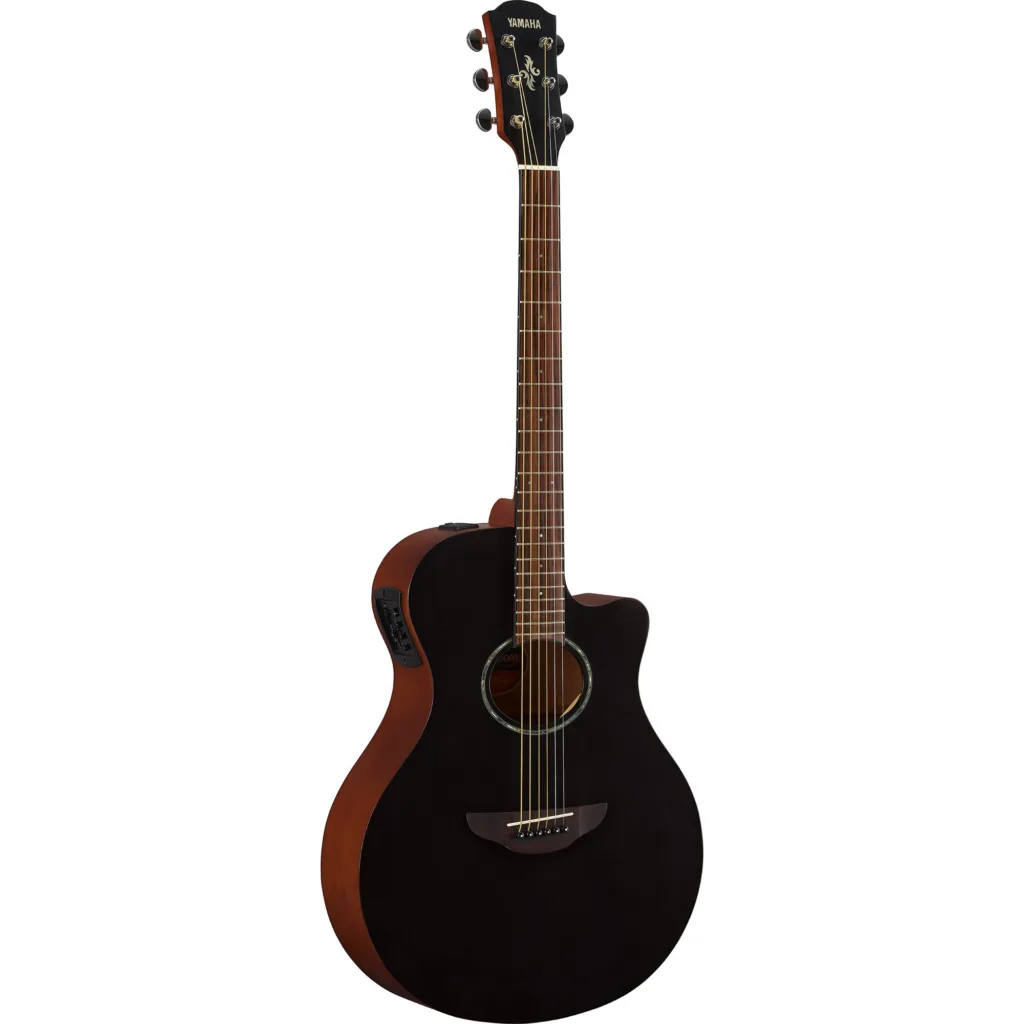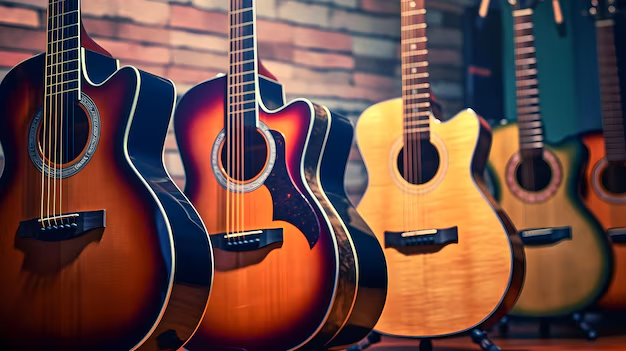Are you a guitar enthusiast looking to expand your collection? Or maybe you’re a beginner searching for the perfect instrument to start your musical journey. Either way, chances are you’ve come across the term “APX style guitar” in your search. But what exactly does this mean? Is it worth investing in one?
In this comprehensive guide, we’ll uncover the mystery behind APX style guitars – from their unique design and sound to their history and popularity among musicians. Whether you’re a seasoned player or just starting out, this article will give you all the information you need about APX style guitars so that you can make an informed decision when choosing your next instrument. So let’s delve into the world of APX style guitars and see what makes them stand out!
So, What is APX style guitar?
APX style guitars are a popular choice among musicians due to their unique sound and design. These guitars were first introduced by Yamaha in 1987 and have since become a staple in the music industry.
The APX stands for “Acoustic-Electric” which refers to the guitar’s ability to be played both acoustically and amplified through an electric system. This makes it a versatile instrument that can be used in various settings, from intimate acoustic performances to large concerts.
One of the defining features of APX style guitars is their slim body shape. Unlike traditional acoustic guitars with larger bodies, APX models have a thinner profile which makes them easier to hold and play for extended periods of time. This also gives them a brighter tone compared to other acoustic guitars.
In terms of construction, APX style guitars typically have solid spruce tops with laminated mahogany or rosewood backs and sides. The combination of these woods produces a well-balanced sound with good projection and resonance.
Another notable feature is the cutaway design on the body, allowing easier access to higher frets on the neck. This makes it ideal for players who enjoy playing solos or intricate melodies.
APX style guitars also come equipped with high-quality electronics, making them perfect for live performances or recording sessions. The built-in preamp allows for easy adjustments of volume, tone, and EQ settings while performing.
Overall, APX style guitars offer a modern twist on traditional acoustic instruments without compromising on quality or sound. Their sleek design, versatile capabilities, and rich tones make them an excellent choice for any musician looking for something unique yet reliable.
Understanding the Design and Features of APX Style Guitars
The APX style guitars present an exquisite blend of elegance and functionality, making them a favorite among both novice and seasoned musicians. These guitars are distinguished by their slim bodies, which offer a comfortable fit when held close. Unlike bulkier models, the thinner profile makes it easier to maneuver around the fretboard. This design is perfect for intricate fingerpicking as well as dynamic strumming patterns. The ease of playability is especially beneficial for younger or smaller-framed players who might struggle with larger instruments.
What truly sets APX style guitars apart are their sophisticated features that cater to modern musical needs. Many come equipped with built-in preamps and pickups, allowing seamless transitions from acoustic to amplified sound without compromising tonal quality. Additionally, these guitars often boast cutaway designs, granting effortless access to higher frets—ideal for solos that soar above the mix.
“It’s like these guitars were crafted with versatility in mind,” says one guitarist.
Whether you’re jamming at home or performing on stage, the reliability of an APX guitar adds confidence to your performance.
Moreover, they typically feature ornate rosettes and tasteful inlays that add a hint of visual flair without being too flashy. An array of finish options lets you choose between classic wood grains or more modern hues—something sure to appeal to anyone’s aesthetic preferences.
In sum: sleek design combined with innovative features ensure that APX style guitars remain a top pick for countless musicians worldwide.
Exploring the Sound Quality and Playability of APX Style Guitars
APX style guitars are a marvel when it comes to delivering both rich sound quality and exceptional playability. The sound these instruments produce is nothing short of captivating, largely thanks to their innovative design. Featuring thinner bodies compared to traditional acoustic guitars, APX models achieve a balanced resonance that’s perfect for various genres. Whether you’re strumming gently or picking out intricate melodies, the sound remains crisp and clear. This makes them ideal not just for casual playing but also for recording sessions where every note matters.
On the front of playability, APX guitars truly shine. Their slim necks make chord transitions smoother than ever, which is especially great for those just starting out or players with smaller hands. Additionally, most models come with cutaways allowing easy access to higher frets—a boon for anyone who loves solos or more intricate fingerwork high up on the fretboard.
- Slim necks for effortless chords
- Cutaway design facilitating upper fret access
- Lighter body reducing strain during long sessions
Moreover, many APX guitars are equipped with built-in electronics that facilitate seamless amplification without compromising on natural acoustics. All in all, whether you’re jamming at home or performing live on stage, an APX guitar often feels like an extension of your own musical soul—effortlessly blending comfort and quality into one beautiful package.
Read also: What guitar does Coldplay play

Tracing the History and Evolution of APX Style Guitars
The APX style guitar is a fascinating chapter in the history of musical instruments. Emerging in the late 1980s, it was crafted with both electric and acoustic players in mind. These guitars, known for their sleek bodies and unique sound quality, quickly found favor among musicians who wanted versatility without sacrificing depth or richness. With its thin profile and cutaway design, the APX provided excellent playability and access to higher frets—ideal for navigating complex chords or intricate solos.
What made these guitars particularly special was their blend of traditional craftsmanship with modern innovation. Builders used advanced electronic systems to capture the true acoustic essence while offering amplified performance without feedback issues—essentially providing a best-of-both-worlds experience. The use of solid spruce tops combined with various types of tonewoods ensured each guitar delivered a warm yet powerful resonance. Over time, improvements such as upgraded tuners, enhanced preamps, and even exotic wood finishes kept evolving this already beloved instrument into something continually fresh yet timeless.
– Sleek body
– Unique sound quality
– Cutaway design
Incorporating elements from classic models while pushing boundaries through technology has allowed APX style guitars to carve out an enduring legacy that continues to inspire new generations of musicians today.
Would you like me to add anything else?
Why are APX Style Guitars Popular Among Musicians?
APX style guitars have captured the hearts of musicians worldwide, and it’s easy to see why. These guitars are celebrated for their sleek, compact design that is perfect for performers who crave comfort without sacrificing sound quality. The slim body makes it easier to hold, especially during long gigs or practice sessions. Plus, they come with a cutaway feature that allows players to reach higher frets effortlessly—a blessing for those intricate solos.
Another reason behind their popularity lies in the advanced electronics embedded within these instruments. With built-in pickups and preamps, APX guitars deliver a rich and balanced tone whether you’re playing acoustically or plugged into an amp. They also offer versatile sound-shaping options right at your fingertips:
- Volume controls
- Tone adjustments
- Feedback reduction capabilities
These features make them an excellent choice for recording sessions and live performances alike. Besides all these technical benefits, there’s just something about holding an APX guitar—it feels like you’re cradling a piece of musical art designed specifically with the modern musician in mind.
You may also like: conover cable piano
Making an Informed Choice: Is an APX Style Guitar Right for You?
Deciding whether an APX style guitar is the right choice for you involves understanding its unique features and how they might suit your needs. The APX boasts a thin body, making it easy to handle, especially if you’re on the petite side or just prefer something more manageable. It’s often praised for its comfort during long playing sessions, allowing your fingers to dance effortlessly across the fretboard. This kind of guitar typically has a bright sound that can cut through in both solo performances and band settings. It’s perfect for those who appreciate clarity over booming bass.
But let’s dig into when this style truly shines:
- Recording Sessions: Its clarity makes it ideal for studio work.
- Live Performances: The built-in electronics ensure you’re heard without needing extra gear.
- Diverse Genres: From folk to pop, this versatile instrument adapts well.
Of course, every coin has two sides. If you’re someone who craves deep resonance and rich low-end tones, you might find the APX’s sound lacking compared to traditional dreadnoughts or jumbos. However, don’t dismiss it too quickly! For many players—especially those traveling or performing live frequently—the convenience factor alone is a game-changer.
The key takeaway? Really think about what you value most in a guitar before making that final decision.

